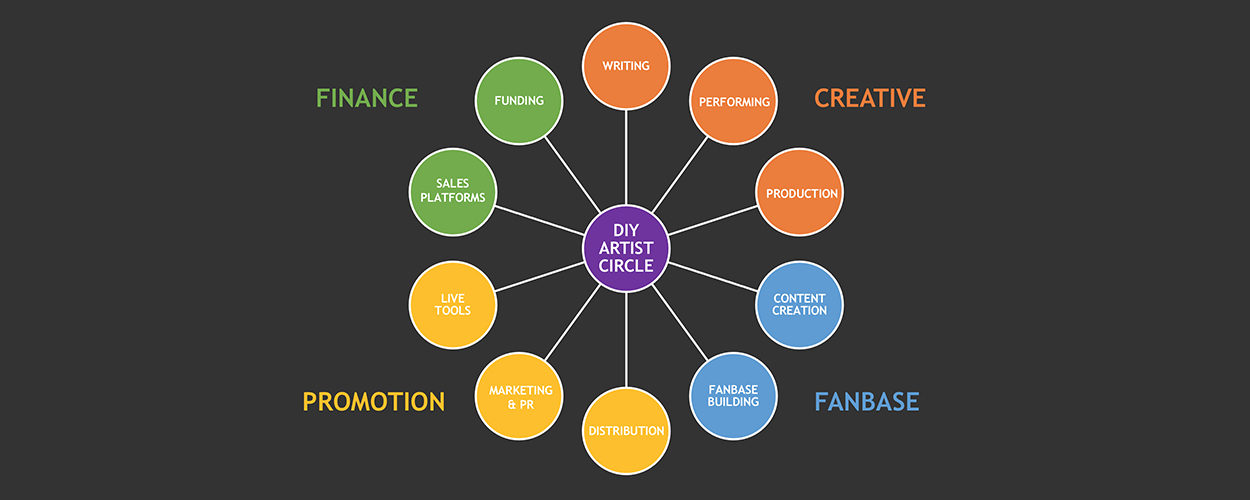This website uses cookies so that we can provide you with the best user experience possible. Cookie information is stored in your browser and performs functions such as recognising you when you return to our website and helping our team to understand which sections of the website you find most interesting and useful.
Business News Education & Events Pathways Into Music Update
Industry experts inform the Pathways Into Music artist circle at The Great Escape: Part Four
By CMU Editorial | Published on Friday 20 May 2022

CMU’s Pathways Into Music Foundation last week used the MUSIC + EDUCATION sessions at The Great Escape to present more of its research work which aims to provide music educators and talent development organisations with resources that they can use to give DIY phase artists the knowledge and information they need to pursue a career around their music-making.
At TGE, Foundation director Phil Nelson presented the artist circle, a way of understanding the process artists go through when growing an audience and business around their music.
That begins with creative activities, and then moves onto fanbase building, which is in turn amplified through the promotion of releases and shows, and finally artists look for ways to raise funds and generate income around their music. So there are four quarters to the artist circle: creative, fanbase, promotion and finance.
With the artist circle introduced, music industry experts were then invited on stage at TGE to together compile the ten key pieces of knowledge and information that educators and talent development teams should be looking to communicate to DIY phases artists for each quarter of the circle.
Providing the tips for the finance quarter were Chris Hunte from Addition, Lucy Stone from No Stone Unturned Fundraising, and Whiskas from Music Local and Launchpad.
1. Income from shows and streaming will be modest at the start – but you should think about ways you can generate money from your most engaged fans. Are there products and services they might pay for that are easy to deliver? Would they make a regular donation to support your work or pay a regular membership fee to access premium content? Would they commit to buy products and services in advance, before you’ve made any financial commitment?
2. Once you are selling products and services to your fans, think about your pricing strategy – make sure you have things that your fans want to pay for at different pricing levels, so however much money they have available, there is a way for them to support you.
3. Research what grant funding is available for people making music within your genre at your level. There are 8000+ trusts out there that offer funding – how do you find them? What do they want?
4. When you are seeking funding, have a well thought out plan about what funding schemes you are going to target, when and for what projects. But make sure the plan is adaptable – so that you can evolve projects to different funding opportunities.
5. As with everything else, personal relationships are important in the funding world too. The people working at funding organisations want you to succeed and will have lots of practical tips and advice on how to apply for grants. Think about how you can connect with those people.
6. When you are applying for grant funding, resilience is key – you will get a “no” more than a “yes”. How do you deal with that? And how can you learn from the rejections?
7. Think about the new opportunities that are emerging for artists at all levels. Livestreaming has become a much bigger deal since the pandemic – whether via social media apps where you can use digital gifting tools or with ticketed livestreaming events. Look at what other artists are doing in this domain and consider whether it could work for you.
8. Another area that has been generating a lot of interest in the last year is NFTs. Again, research what other artists are doing in this domain and consider whether there could be opportunities to pursue for you and your music.
9. Are there any companies you could collaborate with to create exciting new products and services for your fanbase? For example, could you partner with manufacturing companies to create branded products that you can then sell direct-to-fan?
10. Try to find time to think a little longer term. Work out what you are going to do next after your current projects. If those current projects are a success, are there platforms, funders or other initiatives – or music industry business partners – that could help you progress further on your pathway into music?
You can check out all of the artist circle tips by downloading the latest Pathways Into Music Research Summary here.





